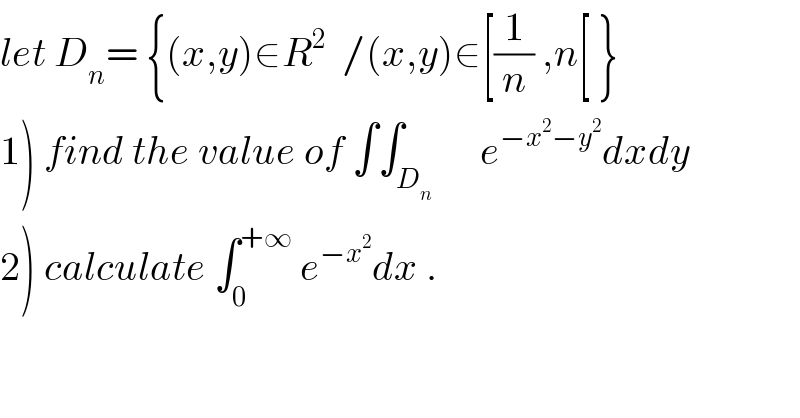
Question and Answers Forum
Question Number 51994 by maxmathsup by imad last updated on 01/Jan/19

Commented by Abdo msup. last updated on 03/Jan/19
![changement x=r cosθ and y=r sinθ give x^2 +y^2 =r^2 but (1/n^2 )≤x^2 ≤n^2 and (1/n^2 )≤y^2 ≤n^2 ⇒ (2/n^2 )≤x^2 +y^2 ≤2n^2 ⇒(2/n^2 ) ≤r^2 ≤2n^2 ((√2)/n) ≤r≤(√2)n also x≥0 and y≥0 ⇒0≤θ≤(π/2) ∫∫_(D_n ) e^(−x^2 −y^2 ) dxdy =∫∫_(((√2)/n)≤r<(√2)n and 0≤θ≤(π/2)) e^(−r^2 ) rdr dθ =(π/2) (−(1/2))[ e^(−r^2 ) ]_((√2)/n) ^((√2)n) =(π/4){ −e^(−2n^2 ) +e^(−(2/n^2 )) } 2) we have ∫∫_D_n e^(−x^2 −y^2 ) dxdy =∫_(1/n) ^n e^(−x^2 ) dx.∫_(1/n) ^n e^(−y^2 ) dy =(∫_(1/n) ^n e^(−x^2 ) dx)^2 ⇒ lim_(n→+∞) (∫_(1/n) ^n e^(−x^2 ) dx)^2 =lim_(n→+∞) D_n =(π/4) ⇒ (∫_0 ^(+∞) e^(−x^2 ) dx)^2 =(π/4) ⇒∫_0 ^∞ e^(−x^2 ) dx =((√π)/2) .](Q52162.png)
| ||
Question and Answers Forum | ||
Question Number 51994 by maxmathsup by imad last updated on 01/Jan/19 | ||
 | ||
Commented by Abdo msup. last updated on 03/Jan/19 | ||
![changement x=r cosθ and y=r sinθ give x^2 +y^2 =r^2 but (1/n^2 )≤x^2 ≤n^2 and (1/n^2 )≤y^2 ≤n^2 ⇒ (2/n^2 )≤x^2 +y^2 ≤2n^2 ⇒(2/n^2 ) ≤r^2 ≤2n^2 ((√2)/n) ≤r≤(√2)n also x≥0 and y≥0 ⇒0≤θ≤(π/2) ∫∫_(D_n ) e^(−x^2 −y^2 ) dxdy =∫∫_(((√2)/n)≤r<(√2)n and 0≤θ≤(π/2)) e^(−r^2 ) rdr dθ =(π/2) (−(1/2))[ e^(−r^2 ) ]_((√2)/n) ^((√2)n) =(π/4){ −e^(−2n^2 ) +e^(−(2/n^2 )) } 2) we have ∫∫_D_n e^(−x^2 −y^2 ) dxdy =∫_(1/n) ^n e^(−x^2 ) dx.∫_(1/n) ^n e^(−y^2 ) dy =(∫_(1/n) ^n e^(−x^2 ) dx)^2 ⇒ lim_(n→+∞) (∫_(1/n) ^n e^(−x^2 ) dx)^2 =lim_(n→+∞) D_n =(π/4) ⇒ (∫_0 ^(+∞) e^(−x^2 ) dx)^2 =(π/4) ⇒∫_0 ^∞ e^(−x^2 ) dx =((√π)/2) .](Q52162.png) | ||